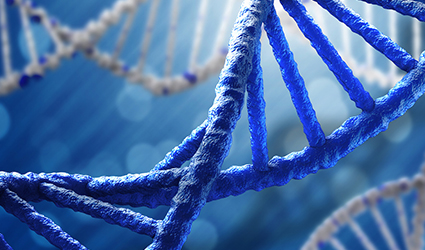Study Unravels New Protein Complex that Repairs Broken DNA Ends
July 23, 2018
Source: News Medical
 1,188
1,188

In a major breakthrough in cancer research, a team of scientists from the University of Toronto, The Institute of Cancer Research, London, The Netherlands Cancer Institute and the University of Bern have discovered how cells repair damaged strands of DNA. They revealed a brand new protein complex in cells that protect broken DNA ends and causes its repair, in their study published in Nature on Wednesday.
Promising new drugs called PARP inhibitors or platinum-based chemotherapies to target the same type of DNA repair system that this complex, named as ‘Sheildin’ complex, activates for use in cancer cells. It was also found to be involved in the production of precise antibodies in an immune response and thus, mutations could lead to immune-related disorders.
The discovery could guide investigations to project and monitor treatment for patients with mutations in BRCA1, BRCA2 or other DNA repair genes, treated with platinum-based chemotherapies or exciting new drugs called PARP inhibitors which cash in upon the inability of cancer cells to repair their DNA.
The Shieldin complex, when intact, attaches itself to the broken DNA, compelling cancer cells to try to repair their DNA in a manner that renders them susceptible to PARP inhibitors and platinum chemotherapies. However, any mutation leads to immediate resistance to PARP inhibitors.
Study lead author and professor at the University of Toronto, Daniel Durocher said, "PARP inhibitors hold great promise for breast and ovarian cancer treatment, but we must understand why they sometimes don't work, or stop working altogether. Knowing more about how cancer evades PARP inhibition by studying basic DNA repair mechanisms brings us a big step closer to this objective, which will improve how we treat some of the most intractable cancers."
By DduRead more on
- Things to Know before Buying Newborn Baby Incubators March 31, 2022
- CRUK researchers develop new early-stage rectal cancer treatment December 12, 2020
- DNA Testing of Babies Could Save Lives but Still Raises Questions June 2, 2020
- Highly Resistant Food Poisoning Bug Responds to Antibiotics September 6, 2018
- Smartphone Based Diagnosis to Identify Mosquitoes Transmitting Infection September 5, 2018
your submission has already been received.
OK
Subscribe
Please enter a valid Email address!
Submit
The most relevant industry news & insight will be sent to you every two weeks.



